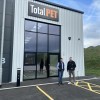Nine out of ten fleet decision-makers in SMEs still prefer to buy company vehicles outright rather than leasing them. While this preference for ownership is long-standing among smaller businesses, it has definite financial drawbacks.
By Richard Cowell, business development manager, Bowker.In particular, it ties up large sums of money that could be put to more profitable use. Buying, managing and selling vehicles is also time-consuming. Directors might well ask whether their business should be running what is essentially a vehicle trading side-line alongside its core activity.
Spreading the cost of buying cars with Hire Purchase helps to smooth out cashflow. But the cost of HP is usually higher than a lease, unless the customer puts down a large deposit on the car – which, again, represents tied-up money.
Less money up front. Typically, customers choose to pay three to six monthly payments as a deposit, though it is possible to pay as little as one month in advance.
Lower monthly payments.Fully predictable cost of ownership. Although HP and leasing both offer predictable payment schedules, with HP (or full up-front payment) you only discover the car’s full cost to the business when you sell it.
Lower administrative burden.Tax advantages. It’s very rare for an employer to be able to recover the VAT on a vehicle they’ve bought. But leasing companies can reclaim VAT on new cars, allowing them to pass on the 20% saving. Lease customers can also claim 50% of the VAT on the finance element of monthly lease rentals and 100% of VAT on any maintenance element. For corporation tax purposes, companies can set the full amount of finance rentals on cars that emit less than 130g/km of CO2 against taxable profits.
Flexibility.In short, car leasing offers a potential credit lifeline to any business that’s concerned about its cashflow and borrowing. And, unlike bank loans and overdrafts, lease financing for vehicles is still readily available to SMEs. On top of that, businesses can usually release cash tied up in existing fully-owned vehicles by selling them to a leasing company and leasing them back.
Enjoyed this? Read more from Lancashire Business View





















